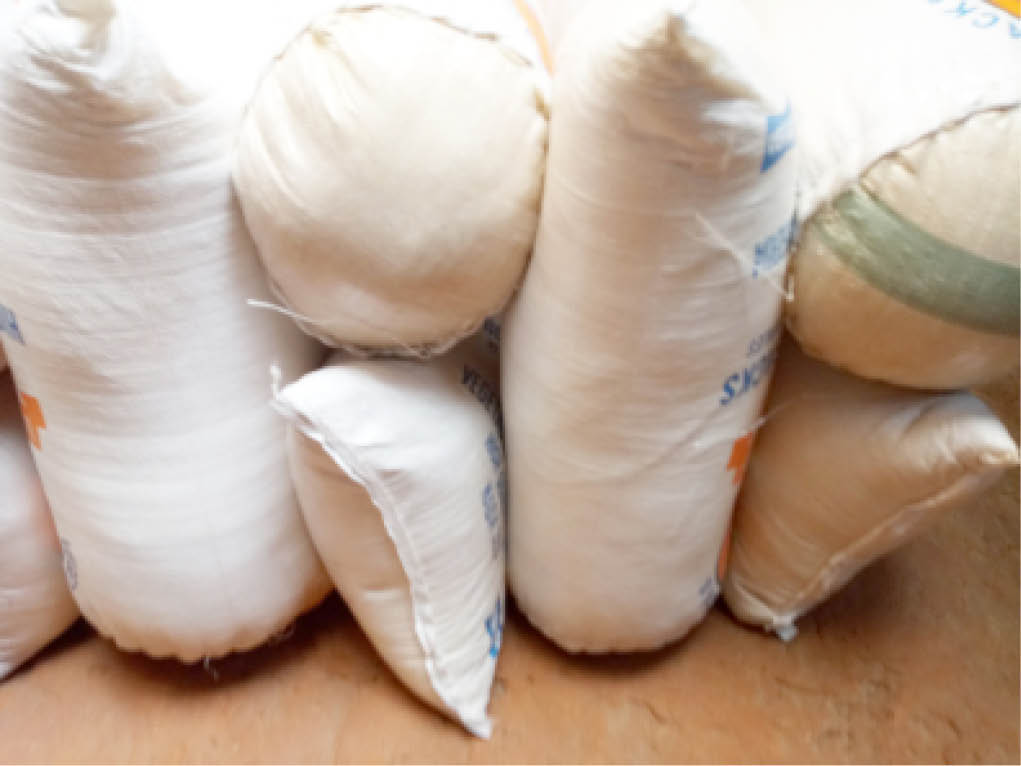Danger of Customs palliative rice
The Akwa Ibom State Governor, Mr Udom Emmanuel, recently told journalists that the federal government palliatives of 1,800 bags of customs bond rice sent to the state was not good for consumption. Governor Emmanuel who disclosed this during a press conference in Uyo said government could not reject the palliatives because it was a gift […]

Bags of garri at Sokoto central market
The Akwa Ibom State Governor, Mr Udom Emmanuel, recently told journalists that the federal government palliatives of 1,800 bags of customs bond rice sent to the state was not good for consumption. Governor Emmanuel who disclosed this during a press conference in Uyo said government could not reject the palliatives because it was a gift but added he would not distribute the rice since it has changed colour. He said he was going to send the rice for test and until the test result is out, he would not distribute it.
In the same vein, the Oyo State Government similarly rejected the 1,800 bags of rice meant as Covid-19 palliatives by the Nigerian Customs Service on the basis that they were bad and unfit for consumption. A statement by the Chief Press Secretary to Governor Seyi Makinde, Mr. Taiwo Adisa, who equally serves as a member of the Covid-19 Task Force, indicated that any claim to the contrary was an attempt at endangering the lives of the people of the state. He said “No government that is worth its name would agree to serve its people with food items that are infested with weevils that are clearly visible to the eyes”. Adisa said the media was invited to see the weevils-infested bags of rice where they have been kept in the storehouse at the Secretariat in Ibadan. He said television cameras were allowed to film the bags of rice to reveal the real situation. The Executive Adviser to the Governor on Agribusiness, Dr. Debo Akande, who also addressed the media said the state was ready to receive palliative rice if Customs could send any consignment that is good for consumption.
Reacting to officials of Oyo state government, Oyo/Osun Command of the Customs said the bad bags of rice must have been picked from a wrong store; adding that it was ready to immediately send in 600 bags to replace the bad ones. But when officials from the state went to inspect the new consignment, it discovered that at least 30 percent of the 600 bags promised as replacement were also infested with weevils.
It was a drama between officials of the Oyo State Government and men of the Oyo/Osun Area Command of the Nigeria Customs Service in Ibadan when the latter refused to take back the 1,800 bags of rice donated to the state by the Federal Government. Officials of the Oyo State Government led by the Commissioner for Agriculture and Rural Development, Jacob Ojemuyiwa, were denied entry at the main gate of the Nigeria Customs premises in Ibadan. Addressing journalists on the matter, Ojemuyiwa said, “The state had written a letter to the Nigeria Customs Service indicating that the bags of the weevil-infested rice would be returned.” The commissioner later said the team would report back to the State Executive Council for further necessary actions. An official of the Customs who spoke under condition of anonymity said the delegate was turned back because the command had not received any directive to receive the rejected bags of rice.
The on-going bickering between the Nigeria Customs and the Oyo state government is unfortunate. The fact that two state governments have raised concerns over the quality of the rice delivered by the Nigeria Customs as part of palliatives offered by the federal government to cushion the effects of lockdown measures being enforced in parts of the country calls for urgent investigations in to the matter. Given the culture of the deep-seated corruption in the country, many things could have happened at different stages of the delivery process.
Investigations should reveal the genuineness of the claims by both Akwa Ibom and Oyo states. If the claims are proved right, the weevil-infested bags of rice should quickly be withdrawn from all the states that have taken delivery of them.
With all the national and global challenges that have been induced by COVID-19, Nigeria cannot afford to have another epidemic triggered by infested rice. In emergencies such as presented by COVID-19, we encourage the Ministry of Humanitarian Affairs, Disaster Management and Social Development to prioritize its stock in strategic grains silos located in parts of the country over commodities seized by Customs when it plans to offer palliatives to citizens.
